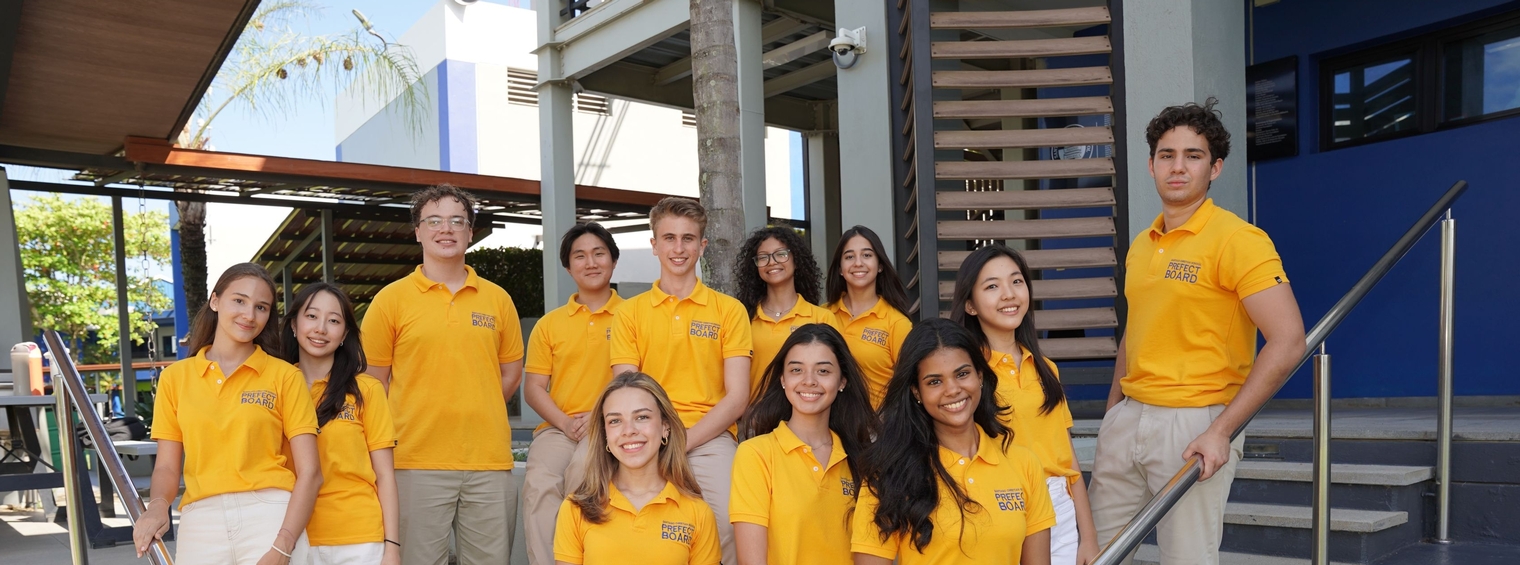

"Religion that God our Father accepts as pure and faultless is this: to look after orphans and widows in their distress and to keep oneself from being polluted by the world."
James 1:27
Student Leadership
SCS develops servant leaders who reflect the character, wisdom, and influence of Jesus within the school community and beyond. The social-emotional curriculum encourages leadership development at all levels, while formal leadership programs and responsibilities begin in middle school and deepen through the high school years.
- To provide practical leadership at SCS under the guidance of a staff mentor
- To practice Biblical justice by seeking ways for SCS to share time, talent, and treasure with SCS partner schools in their specified area of leadership
In August, prefects attend a unifying retreat in which servant leadership is more deeply explored, personal and group goals are set, and plans are initiated for the coming year. Prefects are the tone-setting welcome committee for returning students, poised to lead their peers into a positive and productive year. The Prefect Board is comprised of seven offices:
- Senior Prefect Plan and lead all prefect meetings, meet with the prefect advisors weekly, and work with senior class advisor and senior class council to provide leadership for all senior class activities
- Academics Prefect Manage the student tutoring programs, encourage student use of library resources, and help coordinate activities with the NHS and NJHS
- Spiritual Life Prefect Assist with weekly chapel programs, food drive and other campaigns, TNL ministries, and find new ways to encourage students’ spiritual growth
- Athletics Prefect Assist with the sports program, including regular score announcements, tournaments, athlete recognition, pep rallies, and other spirit initiatives
- Advancement Prefect Assist with campus tours, fundraising events, Spirit Week, jeans days, school publicity, and special events like Family Day, open houses, etc.
- Fine Arts Prefect Assist with implementation of the fine arts program including fine arts nights, theater performances and publications, and art displays
- Community Prefect Assist with programs that encourage community-building, coordinate the Big Brothers/Big Sisters mentoring program, and assist with other initiatives from the Guidance office
Leadership and Justice Training
By providing critical leadership and justice training and experience at just the right time, SCS students are being shaped into life-long servant leaders who love God and others with everything He has given them. Our aim is that SCS graduates will be people who show love to God and neighbor by reflecting Jesus in character, wisdom, and influence.
The freshman justice milestone project introduces students to basic concepts of social justice, evaluating how justice lies at the center of God's character. Students research modern slavery, discuss ongoing work in justice ministries, interact with those working directly with the victimized and marginalized… and then propose their own solutions to complex issues of justice. In the course of this project, students recognize their position as Jesus's hands and feet to bring justice and good news into places of pain and darkness. They learn that becoming personas íntegras means a commitment to respecting others as image-bearers, demonstrating empathy, and advocating for the voiceless. Challenges to students' presentation and public-speaking skills prepare them to advocate for victims of injustice. This milestone has a distinctly Dominican focus. While much research draws on international research and organizations, students' final projects explore examples of injustice here in the Dominican Republic and challenge them to find realistic solutions to these complex issues.
- Semester One The goal of part one is to hear personally from people who are suffering from social injustices here in the Dominican Republic, document their stories, understand what the Bible says about the injustice, and come up with ideas to raise awareness and help these people.
- Semester Two The goal of part two is to advocate on behalf of those who are suffering from the injustice that was identified first semester. Students make a sustained effort to implement practical strategies to raise awareness and to bring about positive change. For the Bible final exam, students present their capstone projects to a panel of community members and classmates.
Selected students in secondary school have the opportunity to meet monthly with the high school principal to discuss current topics and provide feedback regarding school events. The opportunity allows students to grow as leaders as they receive feedback from peers and directly share the information with campus leadership. Advisory council students are also ambassadors to their peers and play a critical role in providing informed feedback during peer-based discussions.
To find out more about Student Leadership University visit www.slulead.com.
